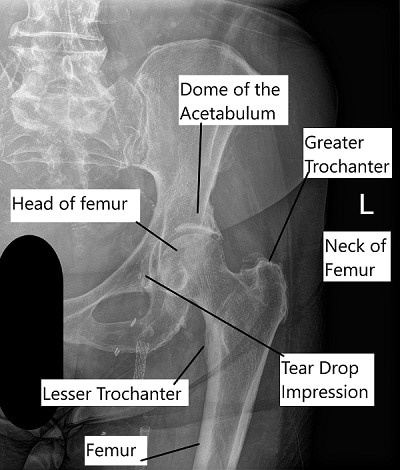Hip Pain
Overview
Hip pain has numerous potential causes, ranging from musculoskeletal complaints such as hip arthritis, greater trochanteric bursitis and iliopsoas impingement to intra-abdominal problems such as sportsman’s hernia, inguinal hernia and athletic pubalgia, and even multifactorial conditions like complex regional pain syndrome and fibromyalgia.
Each of the aforementioned conditions will cause a form of hip pain and the pain will be slightly different depending on the cause. These differences are key to helping your healthcare practitioner achieve a definitive diagnosis of the true cause of your hip pain.

X-ray showing hip anatomy.
Diagnosis
The first step in achieving a diagnosis for your hip pain is consulting a healthcare professional. Any hip pain that does not self-resolve or respond to over-the-counter-analgesia should be presented to an appropriate healthcare professional for diagnosis.
As with most medical problems, a thorough medical history is important to obtain. This includes details about the pain itself and more general information about your medical history.
A physical examination is also essential to achieving a diagnosis – this will involve movement of the painful hip as well as examination of your gait and potentially more specific tests designed to identify specific causes of hip pain.
You will most likely also require medical imaging in some form – what type is up to your healthcare professional to determine.
Treatment
The first line treatment for any joint pain should be rest of the affected joint for a short period of time. Over-the-counter analgesics such as Tylenol or nonsteroidal anti-inflammatory medications are also appropriate.
If neither of these prove effective at relieving your pain then you may require a full course of dedicated physical therapy. If this also proves ineffective then consultation with a healthcare professional in regards to your hip pain is warranted.
More invasive treatments for persistent and refractory hip pain range from injections of corticosteroid and/or local anaesthetic into the hip joint (usually done under imaging guidance by a specialist radiologist) to surgical procedures to address the cause of the hip pain.
These can range from hip arthroscopy in younger patients to address abnormal anatomy that is causing damage to the soft tissues within the hip joint, to pelvic osteotomies to realign the hip joint to preserve the cartilage in the joint for as long as possible, to hip replacement surgery when the normal hip cartilage has worn away and arthritis is the principal cause of your hip pain.
Your healthcare professional should be able to advise you on the most appropriate treatment for you based on your diagnosis, or refer you to another healthcare professional who can.
Summary
Hip pain has a potentially wide range of causes – some are less serious and self-limiting, others will require medical or surgical intervention to treat effectively.
It is important to identify refractory hip pain early on and seek the advice of an appropriate healthcare professional as soon as possible to achieve a diagnosis and ensure you receive appropriate treatment in a timely manner.
Do you have more questions?
How can I differentiate between hip pain caused by musculoskeletal issues, such as arthritis, and pain originating from intra-abdominal problems like hernias?
Distinguishing between musculoskeletal hip pain and pain originating from intra-abdominal issues can be challenging. Asking your healthcare provider about specific symptoms, such as location, severity, and exacerbating factors, may help clarify the underlying cause of your hip pain.
What lifestyle modifications can I implement to alleviate hip pain, and are there any activities I should avoid to prevent exacerbating the condition?
Making lifestyle modifications may help alleviate hip pain and improve overall joint health. Your healthcare provider can offer guidance on activities to avoid and recommend exercises or ergonomic adjustments to support hip health and minimize discomfort.
Are there any specific risk factors or predisposing factors that may increase my likelihood of experiencing hip pain, and how can I mitigate these risks?
Identifying risk factors or predisposing factors for hip pain can help you take proactive steps to mitigate these risks and prevent future episodes of discomfort. Your healthcare provider can provide personalized recommendations based on your medical history, lifestyle factors, and overall health status.
Can psychological factors, such as stress or anxiety, contribute to or exacerbate hip pain, and are there strategies for addressing these factors as part of a comprehensive treatment plan?
Psychological factors, including stress and anxiety, may contribute to or exacerbate hip pain in some individuals. Integrating strategies for addressing psychological factors, such as stress management techniques or cognitive-behavioral therapy, as part of a comprehensive treatment plan may help improve overall pain management and quality of life.
What role does posture and body mechanics play in the development and management of hip pain, and are there specific exercises or techniques to improve alignment and reduce strain on the hip joint?
Posture and body mechanics can influence the development and management of hip pain. Your healthcare provider or physical therapist can recommend exercises or techniques to improve posture, strengthen supportive muscles, and reduce strain on the hip joint, which may help alleviate discomfort and prevent further injury.
Is there a connection between hip pain and other musculoskeletal conditions, such as lower back pain or knee pain, and how can addressing underlying issues in one area of the body impact hip health?
Hip pain may be interconnected with other musculoskeletal conditions, such as lower back pain or knee pain, due to biomechanical relationships within the body. Addressing underlying issues in one area of the body, such as through physical therapy or targeted exercises, may positively impact overall hip health and reduce pain.
Are there any specific dietary supplements or nutritional interventions that may help support joint health and alleviate hip pain, and how do I ensure safe and effective use of these supplements?
Certain dietary supplements or nutritional interventions may offer benefits for joint health and pain management. Your healthcare provider or a registered dietitian can provide guidance on safe and effective use of supplements, as well as recommend dietary modifications to support overall joint health and reduce inflammation.
What role does weight management play in managing hip pain, and are there recommended weight loss strategies for individuals experiencing discomfort or limited mobility due to hip issues?
Weight management can play a significant role in managing hip pain, as excess body weight can increase stress on the hip joint and exacerbate symptoms. Your healthcare provider can offer personalized recommendations for weight loss strategies, including diet modifications, exercise programs, and lifestyle changes tailored to your individual needs and goals.
How can I best advocate for myself in seeking appropriate diagnosis and treatment for hip pain, and what steps can I take to ensure I receive comprehensive care and support throughout the treatment process?
Are there any alternative or complementary therapies, such as acupuncture or massage, that may help alleviate hip pain, and how do I determine if these treatments are appropriate for me?
Alternative or complementary therapies like acupuncture or massage may offer relief for some individuals with hip pain. Your healthcare provider can discuss the potential benefits and risks of these therapies, as well as help you determine if they are appropriate for your specific condition and overall health
What are the potential long-term effects of chronic hip pain, and how can I best manage and cope with ongoing discomfort to maintain quality of life?
Chronic hip pain can have significant long-term effects on quality of life, including decreased mobility, functional limitations, and psychological distress. Learning effective pain management strategies, engaging in regular physical activity, and seeking support from healthcare providers or support groups can help you cope with ongoing discomfort and maintain overall well-being.
How does aging affect the prevalence and management of hip pain, and are there age-specific considerations I should be aware of in addressing my symptoms?
Aging can impact the prevalence and management of hip pain due to factors such as degenerative changes in the joint, decreased muscle strength, and changes in activity levels. Your healthcare provider can provide age-specific recommendations and considerations for managing hip pain, taking into account your individual needs, preferences, and overall health status.
Can hip pain be a symptom of more serious underlying conditions, such as infection or cancer, and what warning signs should I watch for that may indicate the need for urgent medical attention?
Hip pain can sometimes be a symptom of more serious underlying conditions, including infection or cancer. It’s important to be aware of warning signs such as persistent pain, unexplained weight loss, fever, or changes in bowel or bladder function that may indicate the need for urgent medical attention. If you experience any concerning symptoms, seek prompt evaluation from a healthcare provider.
How does gender influence the risk of developing hip pain, and are there gender-specific factors or considerations that may impact diagnosis and treatment?
Gender may influence the risk of developing hip pain due to differences in anatomy, hormonal factors, and activity levels between males and females. Your healthcare provider can discuss gender-specific considerations and recommendations for diagnosis and treatment based on current research and clinical guidelines.
Can certain occupations or activities increase the risk of hip pain, and are there specific ergonomic modifications or preventive measures I should consider to reduce my risk of injury?
Certain occupations or activities that involve repetitive motions, heavy lifting, or prolonged periods of sitting or standing may increase the risk of hip pain and injury. Your healthcare provider or occupational therapist can offer guidance on ergonomic modifications, proper lifting techniques, and preventive measures to reduce your risk of hip pain related to occupational or recreational activities.
What role does inflammation play in the development and progression of hip pain, and are there dietary or lifestyle factors that can help reduce inflammation and alleviate symptoms?
Inflammation may contribute to the development and progression of hip pain, particularly in conditions such as arthritis or bursitis. Your healthcare provider or a registered dietitian can discuss dietary and lifestyle factors that may help reduce inflammation and alleviate symptoms, such as consuming anti-inflammatory foods, maintaining a healthy weight, and managing stress.
Are there genetic factors or hereditary conditions that may predispose me to hip pain, and how can I determine if my family history influences my risk of developing hip problems?
Genetic factors or hereditary conditions may play a role in predisposing individuals to hip pain or musculoskeletal disorders. Discussing your family history with your healthcare provider can help determine if you have any genetic predispositions or familial patterns that may influence your risk of developing hip problems, allowing for proactive management and preventive measures.
What are the potential limitations or risks associated with surgical interventions for hip pain, and how can I make an informed decision about whether surgery is the right option for me?
Surgical interventions for hip pain carry potential limitations and risks, including complications, prolonged recovery periods, and uncertain outcomes. Your healthcare provider can discuss the potential benefits and risks of surgery, as well as alternative treatment options, allowing you to make an informed decision about whether surgery is the right option for you based on your individual circumstances and treatment goals.

Dr. Sebastian Heaven
I provide Orthopaedic patient care at several different locations, including a Regional Joint Assessment Centre, a Level 1 Trauma Centre and a District General Hospital. My scope of practice is broad and includes Trauma, Arthroplasty and Sports Orthopaedics.
My areas of special interest include Primary and Revision Arthroplasty, Periprosthetic Fracture Management and general orthopaedic trauma management in isolation and in the context of complex polytrauma patients. I also have clinical research interests in these areas, as well the development of interprofessional relationships between trauma team members and fellow healthcare professionals.
I have personally written all or most of what's on this page for Complete Orthopedics, and approve the use of my content.
